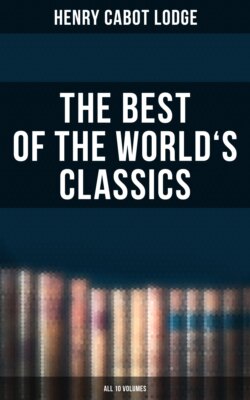Читать книгу The Best of the World's Classics (All 10 Volumes) - Henry Cabot Lodge - Страница 38
На сайте Литреса книга снята с продажи.
ОглавлениеII
THE LIFE MOST DESIRABLE[76]
Table of Contents
He who proposes to make the fitting inquiry as to which form of government is the best, ought first to determine what manner of living is most eligible; for while this remains uncertain, it will also be equally uncertain what government is best. For, unless some unexpected accident interfere, it is probable that those who enjoy the best government will live best according to existing circumstances; he ought, therefore, first to come to some agreement as to the manner of life which, so to speak, is most desirable for all; and afterward, whether this life is the same or different in the individual and the member of a state.
Deeming then that we have already sufficiently shown what sort of life is best, in our popular discourses on that subject, we must now make use of what we there said. Certainly no one ever called in question the propriety of one of the divisions; namely, that as there are three kinds of things good for man, which are, what is external, what belongs to the body, and to the soul, it is evident that all these must conspire to make men truly happy. For no one would say that a man was happy who had nothing of fortitude or temperance, justice or prudence, but was afraid of the flies that flew round him; or who would abstain from nothing, if he chanced to be desirous of meat or drink, or who would murder his dearest friend for a farthing; or, in like manner, one who was in every particular as wanting and misguided in his understanding as an infant or a maniac. These truths are so evident that all must agree to them, tho some may dispute about the quantity and the degree: for they may think, that a very little amount of virtue is sufficient for happiness; but as to riches, property, power, honor, and all such things, they endeavor to increase them without bounds. But to such we say, that it is easy to prove, from what experience teaches us concerning these cases, that it is not through these external goods that men acquire virtue, but through virtue that they acquire them. As to a happy life, whether it is to be found in pleasure or in virtue, or in both, certain it is that it belongs more frequently to those whose morals are most pure, and whose understandings are best cultivated, and who preserve moderation in the acquisition of external goods, than to those who possess a sufficiency of external good things, but are deficient in the rest.
And that such is the case will be clearly seen by any one who views the matter with reflection. For whatsoever is external has its boundary, as a machine; and whatsoever is useful is such that its excess is either necessarily hurtful, or at best useless to the possessor. But every good quality of the soul, the higher it is in degree, becomes much the more useful, if it is permitted on this subject to adopt the word "useful" as well as "noble." It is also evident that the best disposition of each thing will follow in the same proportion of excess, as the things themselves, of which we allow they are accidents, differ from each other in value. So that if the soul is more noble than any outward possession, or than the body, both in itself and with respect to us, it must be admitted, of course, that the best disposition of each must follow the same analogy. Besides, it is for the sake of the soul that these things are desirable, and it is on this account that wise men should desire them, and not the soul for them.
Let us therefore be well agreed that so much of happiness falls to the lot of every one as he possesses of virtue and wisdom, and in proportion as he acts according to their dictates; since for this we have the example of the God Himself, who is completely happy, not from any external good, but in Himself, and because He is such by nature. For good fortune is something of necessity different from happiness, as every external good of the soul is produced by chance or by fortune; but it is not from fortune that any one is just or wise. Hence it follows, as established by the same reasoning, that the state which is best, and acts best, will be happy: for no one can fare well who acts not well; nor can the actions either of man or city be praiseworthy without virtue and wisdom. For valor, justice and wisdom have in a state the same force and form as in individuals; and it is only as he shares in these virtues that each man is said to be just, wise, and prudent.
FOOTNOTES:
[74] Aristotle has been recognized as a great name in the classic literature of Greece, but this, as Mahaffy points out, is rather as a critic than as a man of letters in the narrow sense of the word. Physically he was unattractive. In his day he was thought ugly. His features were small and his legs thin. A sitting portrait of him, now preserved in Rome, shows a refined and careworn, tho somewhat hard face, in which thought and perhaps bodily suffering have drawn deep furrows. His writings are said to have numbered about four hundred.
[75] From Book I of the "Rhetoric." Translated by Theodore Buckley.
[76] From Book VII of the "Politics." Translated by Edward Walford.
